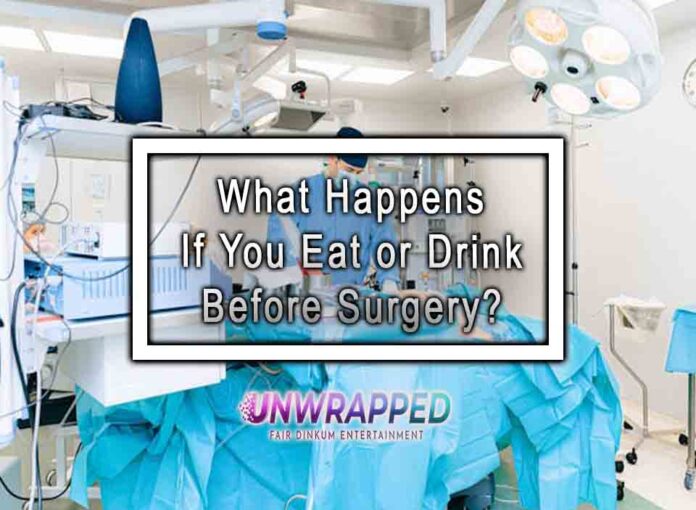What Happens If You Eat or Drink Before Surgery?
Going under the knife—whether it’s for a minor procedure or a major operation—can be nerve-wracking. But one instruction you’ll almost always receive before surgery is: “Don’t eat or drink anything after midnight.” Ever wondered why this is such a big deal? What actually happens if you forget and sneak in a sip of water or a midnight snack? Let’s dig into the science, risks, and guidelines behind this essential pre-surgery rule.
Why You’re Told to Avoid Food and Drink Before Surgery
When you’re scheduled for surgery, your anesthesiologist and surgeon prioritize one thing above all else: your safety. One way they ensure that is by asking you to fast. This rule isn’t just a formality—it’s grounded in science and medical best practices.
The Role of Anesthesia in Digestion
When you’re under anesthesia, your body goes into a sort of “pause mode.” This means:
- Your reflexes shut down: Normally, your body has mechanisms to prevent food or liquid from going into your lungs (aspiration). Under anesthesia, those mechanisms are temporarily switched off.
- Your digestion slows down: Food or drink in your stomach doesn’t move along as it would when you’re awake.
Risk of Aspiration
Aspiration occurs when stomach contents enter the lungs instead of staying where they belong. This can lead to serious complications, including:
- Pneumonia
- Lung damage
- Respiratory distress
Aspiration during surgery is rare but potentially life-threatening, which is why medical teams are so strict about fasting rules.
What Happens If You Eat or Drink Before Surgery?
Let’s break it down:
1. Increased Risk of Vomiting
Imagine lying on an operating table, completely unconscious, and suddenly vomiting. Since your body’s reflexes are suppressed, you can’t clear your airway, leading to choking or aspiration.
2. Delays and Cancellations
If your surgical team discovers that you’ve eaten or drunk something, they may delay or even cancel the procedure. This is frustrating for both you and the medical staff, but it’s done to protect you from preventable risks.
3. Compromised Recovery
Eating or drinking before surgery can lead to complications during the procedure, which might result in a longer recovery time or even additional medical interventions.
What Are the Fasting Guidelines?
General Rules
Fasting guidelines may vary depending on your surgeon, the type of anesthesia, and your specific health condition, but here’s a general breakdown:
- Solid food: Avoid eating solid food for at least 6-8 hours before surgery.
- Clear liquids: You can typically drink clear liquids (like water, black coffee, or tea without milk) up to 2 hours before surgery. Always confirm with your doctor!
- Alcohol: Avoid alcohol for at least 24 hours before surgery, as it can interfere with anesthesia and increase dehydration.
Why the Specific Timing?
- Solid foods take longer to digest, so a longer fasting period is required.
- Clear liquids pass through your stomach quickly, making them less risky if consumed within a shorter timeframe.
Common Myths About Pre-Surgery Fasting
Myth 1: “A Small Snack Won’t Hurt.”
Even a small snack can pose a risk. Your stomach doesn’t differentiate between a “light” meal and a full meal when it comes to digestion under anesthesia.
Myth 2: “I Can Drink Water Right Before Surgery.”
Not always true. While small sips of water are sometimes allowed, drinking too much or too close to surgery can increase the risk of aspiration.
Myth 3: “Fasting is Overkill.”
Medical teams aren’t being overly cautious—these guidelines are based on decades of research and real-life outcomes.
What If You Accidentally Eat or Drink Before Surgery?
Honesty is the best policy. If you’ve accidentally eaten or drunk something, tell your surgical team immediately. It might feel embarrassing, but hiding it can lead to severe complications during your procedure.
Depending on what you consumed and when, your medical team may:
- Reschedule your surgery.
- Adjust the anesthesia plan.
- Take extra precautions to minimize risks.
Tips for Handling Pre-Surgery Fasting
1. Plan Ahead
Schedule your last meal or drink at a convenient time so you’re not tempted to eat closer to the cut-off.
2. Stay Busy
Hunger can feel more psychological than physical. Distract yourself with a book, movie, or light activity to keep your mind off food.
3. Ask Questions
If you’re unsure about fasting guidelines, reach out to your doctor. Better to ask than risk complications.
Memorable Real-Life Stories (Because Who Doesn’t Love a Good Example?)
- The Forgotten Gulp: One patient accidentally drank a glass of orange juice an hour before surgery. The surgical team caught it during pre-op questions, and the procedure was rescheduled to avoid aspiration risks.
- The Honest Overshare: A nervous teenager confessed to eating a granola bar at 2 a.m. The surgical team applauded their honesty and adjusted the schedule, ensuring a safe and smooth procedure.
Conclusion: Follow the Rules for a Smooth Surgery
Eating or drinking before surgery might seem harmless, but it can lead to serious risks like aspiration, delayed recovery, or even surgery cancellation. By following your doctor’s fasting guidelines, you’re not just adhering to a rule—you’re actively safeguarding your health.
So, the next time you’re tempted by that midnight snack, remember: skipping it could literally save your life.
Call-to-Action:
Have questions about surgery prep? Share your thoughts in the comments! Don’t forget to share this article with anyone scheduled for surgery—it might just help them avoid a critical mistake.
See Also: Can You Have Surgery If You’re Pregnant?










